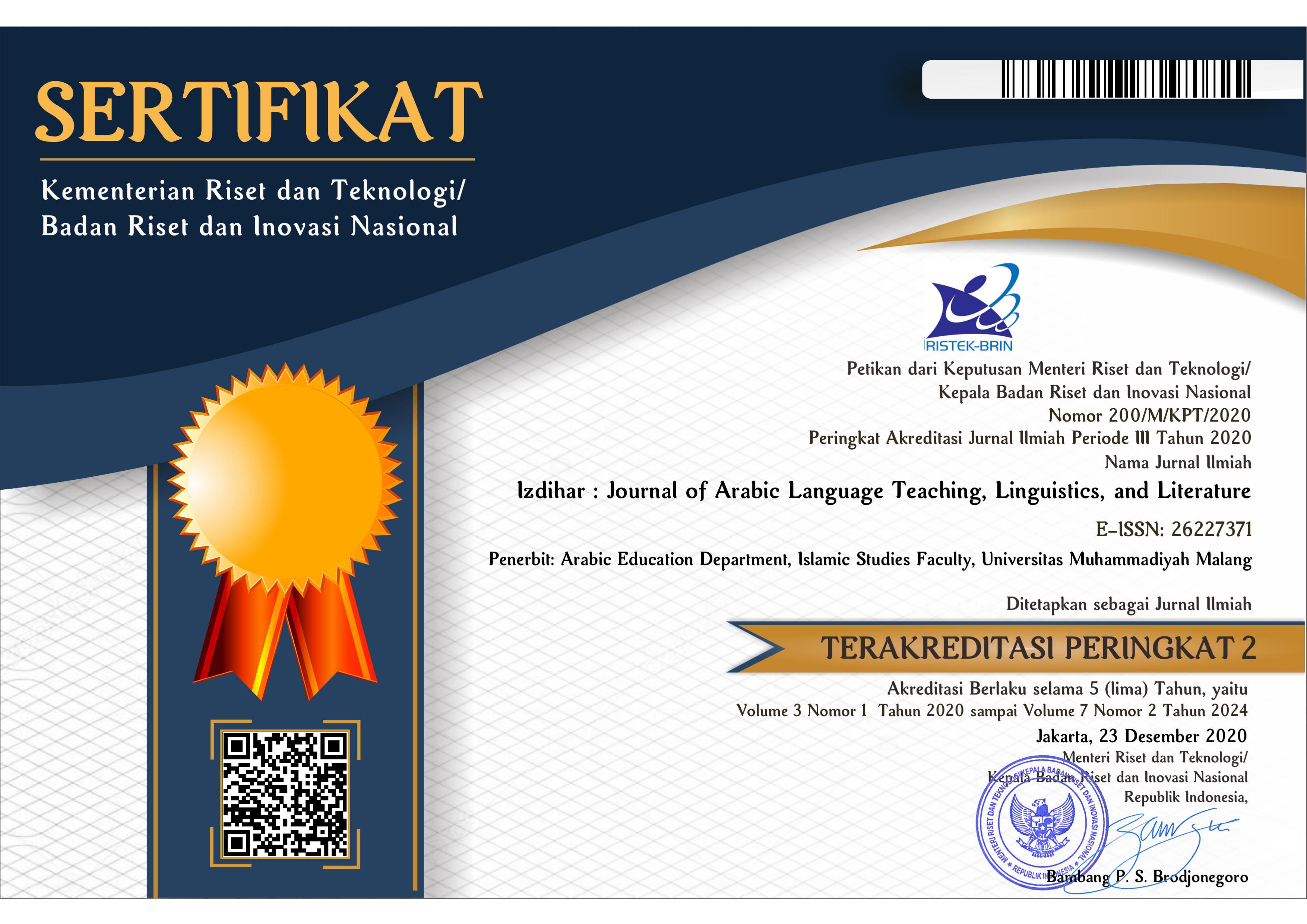Arabic Language Test in the Perspective of Competency-Based Curriculum for Students of Madrasah Aliyah Negeri 3 Malang
DOI:
https://doi.org/10.22219/jiz.v2i2.10003Keywords:
Arabic Language Test, Competency-Based Curriculum, Final School Test QuestionsAbstract
The purpose of this research is to describe the items of the final Arabic language test questions for students of the Government Islamic Secondary School 3 Malang in the light of the proficiency based curriculum (KBK). This research is the type of desk research on the descriptive analytical approach qualitative approach. The data sources in this research are in the form of Arabic language question documents for the final school exam in the curriculum based on proficiency. The data were collected in the manner of documents and interviews. The results of this research are in harmony between the items of the final Arabic language test questions for students of the Madrasah Aliyah 3 Malang in the academic year 2011/2012 with the curriculum on the basis of competence, which contains: Reading skill questions are also suited to normative and basic competence, although these items do not contain items of phonics questions in language questions and listening, speaking and writing items in language skills questions.Downloads
References
Benhard, B. (1954). Content Analysis In Communication Research. Newyork: Hafner.
Djiwandono, S. (2008). Tes Bahasa Pegangan Bagi Pengajar Bahasa. Jakarta: PT. Indeks Anggota IKAPI.
Hsiieh, H.-f., E, S., & Shannon. (2005). Three Approach to Qualitative Contens Analisys, Journal of Qualitative Health Research. Sage Publications, 15(9).
Krippendorff, K., & Wajidi, F. (1980). Analisis isi: Pengantar teori dan metodologi: Rajawali Pers.
Matsna, M., & Mahyudin, E. (2012). Pengembangan Evaluasi dan Tes Bahasa Arab. Tangerang Selatan: Alkitabah.
Sanjaya, W. (2006). Pembelajaran dalam implementasi kurikulum berbasis kompetensi: Kencana.
الحريري, ر. (2008). التقويم التربوي. عمان: دار المناهج للنشر والتوزيع.
الطبيب, أ. م. (1999). التقويم والقياس النفس والتربوي. الإسكندارية: المكتب الجامعي الحديث.
العمري, ع. ا. (2016). القياس والتقيم في مجال تعليم العربية للناطقين بغيرها. الرياض: أبحاث المؤتمر السنوي العاشر.
العنيزي, ي., & أخرون. (1999). مناهج البحث التربوي بين النظرية والتطبيق. الكويت: مكتبة الفلاح للنشر والتوزيع.
حسن, ه., & القايد, ش. (1990). تخطيط المنهج وتطويره. عمان: دار صفاء للنشر والتوزيع.
خليل, م. أ. ا. ح. (2011). التقويم التربوي بين الواقع والمأمول. المدينة المنورة مكتبة الشقر للنشر والتوزيع.
دعمس, م. ن. (2008). استراتيجيات التقويم التربوي الحديث وأدواته. عمان: دار غيداء للنشر والتوزيع.
سالم, ع. أ., & سيد, أ. م. (2005). التقويم في المنظومة التربوية. الرياض: مكتبة الرشد.
طعيمة, ر. أ. المرجع في تعليم اللغة العربية للناطقين بلغات أخرى. مكة المكرمة: جامعة أم القرى.
طعيمة, ر. أ. (1989). تعليم اللغة العربية لغير الناطقين بها : مناهجه وأساليبه. مصرى جامعة المنصورة.
عاشور, ر. ق., & الحوامدة, و. ف. (2010). أساليب تدريس اللغة العربية بين النظرية والتطبيق. عمان: دار المسيرة للنشر والتوزيع.
عباس, ف. (1996). الاختبارات النفسية : تقنياتها إجراءاتها. بيروت: دار الفكر العربي.
علام, ص. (2002). القياس والتقويم التربوي والنفسي. القاهرة: دار الفكر العربي.
عميرة., إ. ب. (1991). المنهج وعناصره. القاهرة دار المعارف.
محمد, ع. ا. (1988). اختبارات اللغة. الرياض: جامعة الملك السعود.
Downloads
Published
How to Cite
Issue
Section
License
Copyright Notice
Authors who publish with this journal agree to the following terms:
- Authors retain copyright and grant the journal right of first publication with the work simultaneously licensed under a Creative Commons Attribution-ShareAlike 4.0 International License that allows others to share the work with an acknowledgment of the work's authorship and initial publication in this journal.
- Authors are able to enter into separate, additional contractual arrangements for the non-exclusive distribution of the journal's published version of the work (e.g., post it to an institutional repository or publish it in a book), with an acknowledgment of its initial publication in this journal.
- Authors are permitted and encouraged to post their work online (e.g., in institutional repositories or on their website) prior to and during the submission process, as it can lead to productive exchanges, as well as earlier and greater citation of published work (See The Effect of Open Access).
Copyright (c) 2019 Izdihar : Journal of Arabic Language Teaching, Linguistics, and Literature

This work is licensed under a Creative Commons Attribution-ShareAlike 4.0 International License.

















